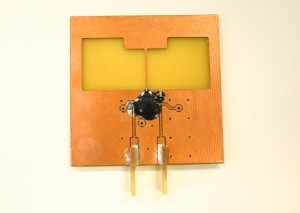Dec 15 2014
A technology developed at North Dakota State University, Fargo, creates precise in-the-ground measurement and monitoring of soil and crop conditions which could provide opportunities for greater yields. The technology also has led to a new start-up company. The c2sensor corp., based in the NDSU Technology Incubator, has concluded a license agreement with the NDSU Research Foundation (NDSU/RF) for the precision agriculture technology.
 The precision agriculture sensor technology developed at North Dakota State University and licensed by c2 sensor is different from current methods, which often require a combination of direct measurement such as soil sampling, or indirect measurements such as remote sensing. Credit: NDSU
The precision agriculture sensor technology developed at North Dakota State University and licensed by c2 sensor is different from current methods, which often require a combination of direct measurement such as soil sampling, or indirect measurements such as remote sensing. Credit: NDSU
Developed by a research team at NDSU, the sensors are constructed using NDSU's patent-pending "direct write" electronic printing techniques to print circuit and antenna patterns directly onto renewable, bio-based substrates. Developed between the NDSU Center for Nanoscale Science and Engineering and the Mechanical Engineering Department at NDSU, the sensors are made with biocomposites so they can be left in the ground to biodegrade without harming soil quality.
The research team placed microsensors in fields at the Soil Health and Agriculture Research Extension (SHARE) farm in Richland county in southeastern North Dakota. Called SEED, which stands for Sensing Earth Environment Directly, the bio-degradable sensors are placed in the ground like seeds, with the potential to directly measure soil salinity, moisture, fertility, and chemicals in real time.
Sensors in the future could be placed directly into the soil during the seeding process, by mixing the sensors in with the seed during planting. A reading device mounted beneath an agricultural vehicle or other agricultural implements would interact with the SEED sensors embedded in the soil, and then provide direct measurements of soil conditions, moisture, and chemical content in real time.
“The NDSU-developed sensor technology licensed by c2sensor is different from current methods, which often require a combination of direct measurement such as soil sampling, or indirect measurements such as remote sensing via probes,” said Corey Kratcha, CEO of c2sensor.
Materials used to create the sensors allow them to be left in place after use, where they can degrade without leaving toxins in the soil. Wireless communication with the sensor is based on passive radio-frequency identification (RFID) technology with no batteries needed.
“As the product is developed, it could assist farmers to monitor salinity levels, nutrient levels for fertilizer applications, moisture and pH levels,” said Chad Ulven, associate professor of mechanical engineering. “It could be coupled with aerial mapping via UAVs or satellite imaging, giving farmers real time soil analysis for end-of-year field work.”
NDSU researchers in microelectronics, mechanical engineering and the NDSU Extension Service who were part of the initial research team include: Chad Ulven, associate professor of mechanical engineering; Cherish Bauer-Reich, Justin Hoey, Rob Sailer, Nathan Schneck and other members of the NDSU Center for Nanoscale Science and Engineering; and Abbey Wick, NDSU Extension Service.
“Generating technologies that lead to start-up companies to bring discoveries to market is one of the ways that NDSU, as a student-focused, land grant, research university, serves the citizens of the state,” said Kelly A. Rusch, vice president for research and creative activity at NDSU.
“Licensing of this sensor technology to c2sensor represents an opportunity to commercialize this research,” said Dale Zetocha, executive director of the NDSU Research Foundation. “Licensing the technology to a North Dakota company supports goals to further diversify economic opportunities in the state.”
The North Dakota Corn Utilization Council provided initial funding at NDSU for the seed sensor project. Following licensing to c2sensor, additional funding through the North Dakota Department of Commerce Venture Grant Program and the North Dakota Centers of Excellence will be utilized to further develop the sensor technology.
About NDSU
NDSU, Fargo, North Dakota, USA, is an economic engine of the state, a top ranked and growing national research power. NDSU is notably listed among the top 108 U.S. public and private universities in the Carnegie Commission on Higher Education’s category of “Research Universities/Very High Research Activity.” As a student-focused, land grant, research institution, NDSU is listed in the Top 100 research universities in the U.S. for R&D in agricultural sciences, chemistry, physical sciences, psychology, and social sciences, based on research expenditures reported to the National Science Foundation. www.ndsu.edu/research
About the NDSU Research Foundation
The NDSU Research Foundation is an independent, not-for-profit organization that supports NDSU in its teaching, research and public service missions. The Foundation manages the intellectual properties developed by faculty, staff and students doing research at NDSU and facilitates commercialization of these technologies. By commercializing intellectual property, the Foundation is able to create resources that are returned to the individual inventors and to the University to promote continued research. www.ndsuresearchfoundation.org
About c2sensor corp
c2sensor, based in the NDSU Technology Incubator, Fargo, North Dakota, provides expertise in bio-degradable sensors under development for precision agriculture and other applications. The start-up company licensed sensor technology from North Dakota State University. Materials used to create the sensors allow them to be left in place after use where they can degrade without leaving toxins in the soil. Wireless communication with the sensor is based on passive radio-frequency identification (RFID) technology.